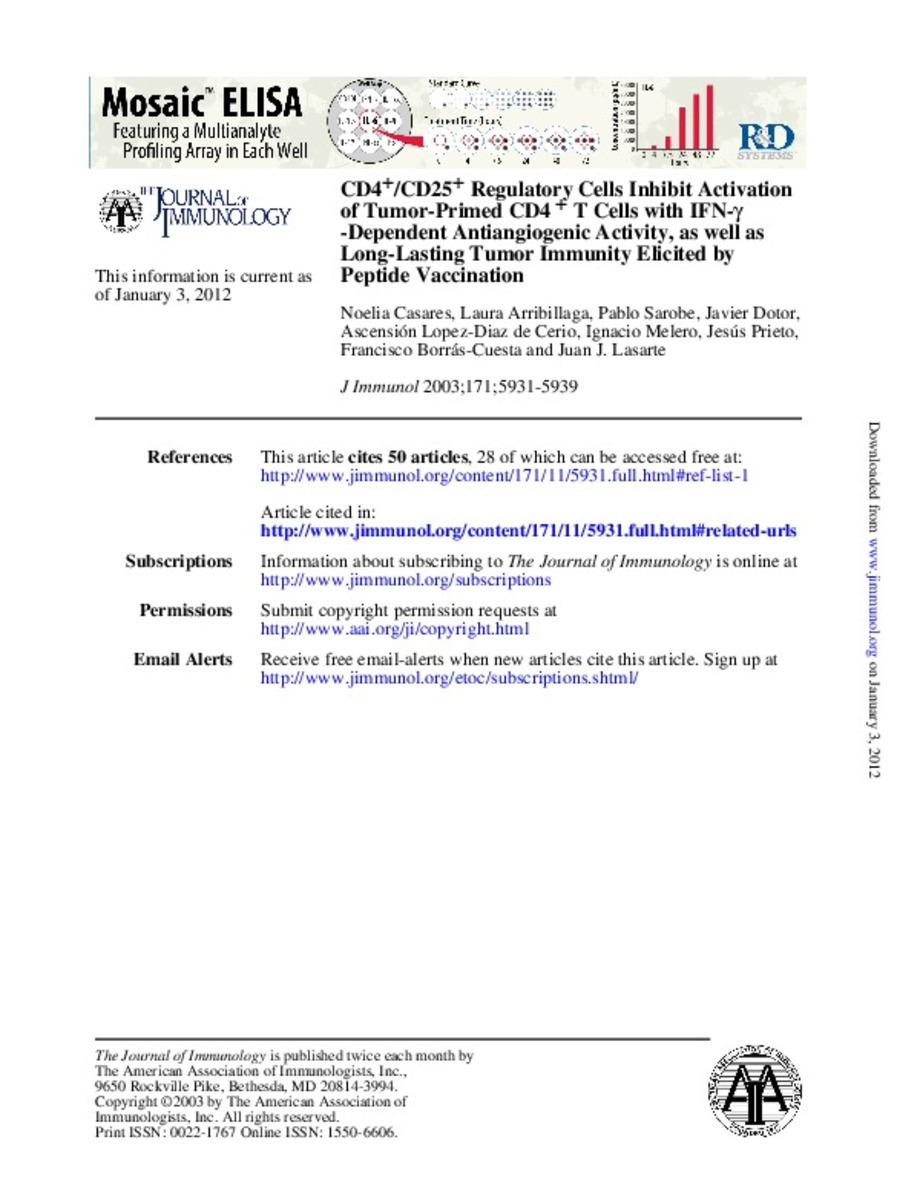Full metadata record
| DC Field | Value | Language |
|---|---|---|
| dc.creator | Casares, N. (Noelia) | - |
| dc.creator | Arribillaga, L. (Laura) | - |
| dc.creator | Sarobe, P. (Pablo) | - |
| dc.creator | Dotor, J. (Javier) | - |
| dc.creator | Lopez-Diaz-de-Cerio, A. (Ascensión) | - |
| dc.creator | Melero, I. (Ignacio) | - |
| dc.creator | Lasarte, J.J. (Juan José) | - |
| dc.date.accessioned | 2012-01-15T14:54:08Z | - |
| dc.date.available | 2012-01-15T14:54:08Z | - |
| dc.date.issued | 2003 | - |
| dc.identifier.citation | Casares N, Arribillaga L, Sarobe P, Dotor J, Lopez-Diaz de Cerio A, Melero I, et al. CD4+/CD25+ regulatory cells inhibit activation of tumor-primed CD4+ T cells with IFN-gamma-dependent antiangiogenic activity, as well as long-lasting tumor immunity elicited by peptide vaccination. J Immunol 2003 Dec 1;171(11):5931-5939. | es_ES |
| dc.identifier.issn | 1550-6606 | - |
| dc.identifier.uri | https://hdl.handle.net/10171/20411 | - |
| dc.description.abstract | CD25(+) regulatory T (T reg) cells suppress the activation/proliferation of other CD4(+) or CD8(+) T cells in vitro. Also, down-regulation of CD25(+) T reg cells enhance antitumor immune responses. In this study, we show that depletion of CD25(+) T reg cells allows the host to induce both CD4(+) and CD8(+) antitumoral responses following tumor challenge. Simultaneous depletion of CD25(+) and CD8(+) cells, as well as adoptive transfer experiments, revealed that tumor-specific CD4(+) T cells, which emerged in the absence of CD25(+) T reg cells, were able to reject CT26 colon cancer cells, a MHC class II-negative tumor. The antitumoral effect mediated by CD4(+) T cells was dependent on IFN-gamma production, which exerted a potent antiangiogenic activity. The capacity of the host to mount this antitumor response is lost once the number of CD25(+) T reg cells is restored over time. However, CD25(+) T reg cell depletion before immunization with AH1 (a cytotoxic T cell determinant from CT26 tumor cells) permits the induction of a long-lasting antitumoral immune response, not observed if immunization is conducted in the presence of regulatory cells. A study of the effect of different levels of depletion of CD25(+) T reg cells before immunization with the peptide AH1 alone, or in combination with a Th determinant, unraveled that Th cells play an important role in overcoming the suppressive effect of CD25(+) T reg on the induction of long-lasting cellular immune responses. | es_ES |
| dc.language.iso | eng | es_ES |
| dc.publisher | American Association of Immunologists | es_ES |
| dc.rights | info:eu-repo/semantics/openAccess | es_ES |
| dc.subject | Angiogenesis Inhibitors/physiology | es_ES |
| dc.subject | CD4-Positive T-Lymphocytes/immunology | es_ES |
| dc.subject | Colonic Neoplasms/immunology | es_ES |
| dc.subject | Down-Regulation/immunology | es_ES |
| dc.subject | Interferon-gamma/physiology | es_ES |
| dc.subject | Lymphocyte Activation/immunology | es_ES |
| dc.subject | Peptides/immunology | es_ES |
| dc.subject | Receptors, Interleukin-2/biosynthesis | es_ES |
| dc.subject | T-Lymphocyte Subsets/immunology | es_ES |
| dc.title | CD4+/CD25+ regulatory cells inhibit activation of tumor-primed CD4+ T cells with IFN-gamma-dependent antiangiogenic activity, as well as long-lasting tumor immunity elicited by peptide vaccination | es_ES |
| dc.type | info:eu-repo/semantics/article | es_ES |
| dc.relation.publisherversion | http://www.jimmunol.org/content/171/11/5931 | es_ES |
| dc.type.driver | info:eu-repo/semantics/article | es_ES |
Files in This Item:
Statistics and impact
Items in Dadun are protected by copyright, with all rights reserved, unless otherwise indicated.






